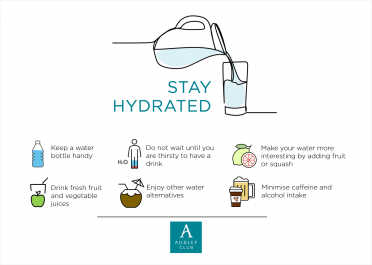More Audley Stories
Browse more top tips from the Audley team.

Us Brits love to talk about the weather. 'It's always raining', 'where's the sun?', and most recently 'It's far too hot'. Rest assured we will soon be discussing rainfall again.
In the UK we're not always equipped to live comfortably in these 30+ temperatures. But we have been here before and there are some tried and tested ways to keep cool, stay hydrated and to protect your plants on the hot summer days.
Drinking enough water every day is crucial for our health and wellbeing. A healthy body simply cannot function properly or survive without adequate hydration, and that becomes even more important in our older years. When people lose too much fluid through sweating, the blood thickens, increasing the risk of clots and forcing the heart to work harder. Heavy sweating also alters the balance of sodium and potassium in body fluids. This can affect nerve and muscle cells, placing further strain on the heart. It is important to drink regularly throughout the day, avoiding caffeine and alcohol, which can cause you to urinate more frequently. Do not rely on thirst, which can be an unreliable indicator of hydration status.
Our Audley care and club teams shared some advice on how to stay hydrated in the hot weather.
Top tip: Do not rely on thirst as an indicator of dehydration. Drink regularly throughout the day. Signs of dehydration include little to no urine, or darker than usual, a dry mouth, sleepiness or fatigue, extreme thirst, headaches, confusion, dizziness, or lightheadedness.

Alongside this, keep in mind all the ways you can save water at home and in the garden.
According to the National Trust, the average UK person uses 150 litres of water every day and 80% of us are wasting water regularly, probably by making one or more of the mistakes below.
More than 3 billion litres of water is lost through leaky pipes.
Even the most loved, well-maintained garden can take a beating in the hot weather. Our gardeners have pulled together their top tips to keep your plants, flowers and lawn hydrated during these scorching temperatures.
By creating an eco-friendly garden you can encourage biodiversity, reduce emissions, and save water.